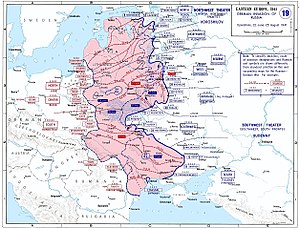
Back انتفاضة يونيو في ليتوانيا Arabic Litvada İyun üsyanı Azerbaijani Июнь ихтилалы (Литва) Bashkir Levantamiento de junio en Lituania Spanish قیام ژوئن Persian Insurrection de Juin en Lituanie French Rivolta di giugno in Lituania Italian 리투아니아 6월 봉기 Korean 1941 m. birželio sukilimas Lithuanian Powstanie na Litwie w 1941 roku Polish
| June Uprising | |||||||
|---|---|---|---|---|---|---|---|
| Part of Operation Barbarossa on the Eastern Front of World War II | |||||||
 German advances from June to August 1941 | |||||||
| |||||||
| Belligerents | |||||||
|
| |||||||
| Strength | |||||||
| 12–15 divisions[2] (137,605-158,775) | 20,000–30,000[3] | ||||||
| Casualties and losses | |||||||
| 5,000[4] | 600[3] | ||||||
The June Uprising (Lithuanian: Birželio sukilimas) was a brief period of the history of Lithuania in late June 1941 between the first Soviet and the Nazi occupations.
A year prior, on June 15, 1940, the Red Army occupied Lithuania and established the unpopular[5] Lithuanian Soviet Socialist Republic, which silenced its critics and suppressed resistance with political repression and state terrorism. When Nazi Germany attacked the Soviet Union on June 22, 1941, the Lithuanian Activist Front initiated the June uprising for which it been preparing since late 1940 and formed the short-lived Provisional Government.[1] The Lithuanian insurgents liberated Kaunas and Vilnius before the Wehrmacht arrived and within a week, all of the Lithuanian territory was free from the occupying Red Army.
The June uprising was directed militarily against the Soviets but politically against the Germans, who were against the declaration of Lithuanian independence, the establishment of the Provisional Government of Lithuania and various Lithuanian self-rule institutions.[1] The German Army was greeted by anti-Communist Lithuanians as liberators from repressive Soviet rule, because of the widespread hopes that Germany would help to recreate Lithuanian independence.[1] For many Lithuanians, even a somewhat autonomous status, akin to the Slovak Republic, was appealing compared to the Soviet occupation.[6] This was not granted by the German occupiers, who steadily replaced Lithuanian institutions with their own and established the Reichskommissariat Ostland on July 17, 1941. Deprived of any real power, the Provisional Government disbanded itself on August 5.[citation needed] Lithuanians were quickly disillusioned with German obstruction to their independence and their subsequent anti-Nazi resistance was passive, in order to not aid Soviet victory and save up Lithuanian military power to resist a future Soviet re-occupation.[7]
- ^ a b c d Brandišauskas 2018.
- ^ Anušauskas 2005, p. 164.
- ^ a b Anušauskas 2005, p. 171.
- ^ Cite error: The named reference
cd1042was invoked but never defined (see the help page). - ^ Литва в период германской оккупации 1941 – 1944 г. (in Russian). runivers.ru. Retrieved 2012-07-18.
- ^ Jazavita 2018, p. 69.
- ^ Jazavita 2018, p. 90.
© MMXXIII Rich X Search. We shall prevail. All rights reserved. Rich X Search